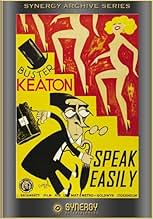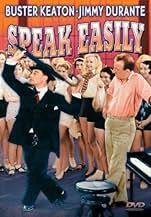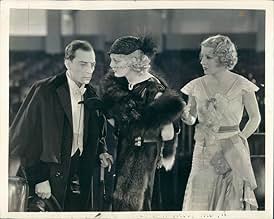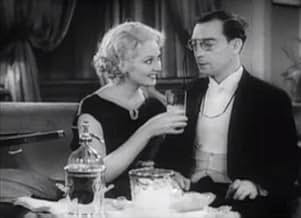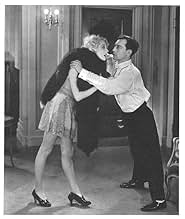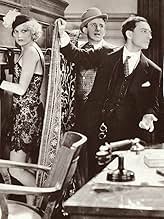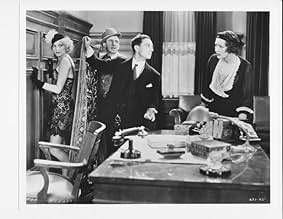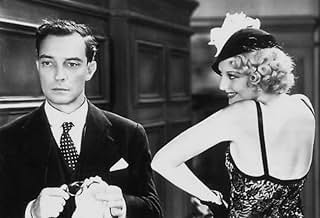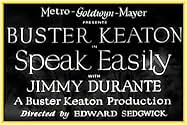VALUTAZIONE IMDb
5,8/10
1245
LA TUA VALUTAZIONE
Aggiungi una trama nella tua linguaA timid professor inherits a large sum of money and decides to fund a terrible musical.A timid professor inherits a large sum of money and decides to fund a terrible musical.A timid professor inherits a large sum of money and decides to fund a terrible musical.
- Regia
- Sceneggiatura
- Star
Loretta Andrews
- Chorus Girl
- (non citato nei titoli originali)
Oscar Apfel
- Lawyer's Representative
- (non citato nei titoli originali)
Reginald Barlow
- Billington
- (non citato nei titoli originali)
Jack Baxley
- Tom - Sheriff's Deputy
- (non citato nei titoli originali)
Sidney Bracey
- Jenkins
- (non citato nei titoli originali)
Jim Farley
- Station Agent
- (non citato nei titoli originali)
DeWitt Jennings
- Sheriff of Lincoln County
- (non citato nei titoli originali)
Fred Kelsey
- Process Server
- (non citato nei titoli originali)
Recensioni in evidenza
What is the most harrowing movie ever made? The gynaecological nightmare of 'Cries and Whispers'? The acid psychodramas of Fassbinder? The discomfiting black comedy of 'Last House on the left? I'm sure for that portion of the film-loving public that tie their masts to the good ship Buster Keaton, there is only one answer - any one of his sound films.
I don't know what flayed my soul more poignantly in this movie - the grounding of Keaton's intricate and expansive physical art to humdrum slapstick; the painful hesitation of this master filmmaker with dialogue - not that he hasn't a lovely, comic voice, or that he can't make dialogue funny; it's just that the studio don't seem to have given him enough takes, and so he seems to be trying to remember his lines before he delivers, which only makes him - Keaton, not his character, look silly; or is it the humiliation of seeing Keaton caught up in a tawdry sex farce, when he has given us some of the richest accounts of romantic frustration in film?
No, I know what was most disturbing - having to watch Buster Keaton, cinema's greatest comedian, sit aside to observe Jimmy Durante doing his schtick. It is horrors such as this that get yer Dantes composing yer Infernos.
MGM seem to have got the curious idea that the best way to adapt Keaton to sound was to turn him into a Marx Brother, complete with verbal pedantry, elaborate, tedious 'clowning', shambolic slapstick, theatrical setting, triumph through chaos, and Thelma Todd. Keaton was just not that sort of comic, and where Groucho's malicious tongue and gleeful opportunism might just have made this plot work, Buster's socially inept professor can't, he is too studied and predictable.
What Buster needed was to be allowed experiment like Lang in 'M', or Rene Clair; he would never have tried to hold back the tide like Chaplin. When a film like 'The General' is alluded to - messing about with trains - the loss becomes even more apparent.
And the thing is, in patches amid the flat direction, the film isn't all that bad - there is an excellent jolt when a camera on the bus leaves Keaton alone at a railway station; and the denouement, if hardly original, is at least livelier than what went before. There is something almost endearing about the way Keaton slows down a plot that needs all the zip it can get.
There is a film in here about loneliness, emotionally paralysing order, the numbing effects of education etc., struggling to get out. The best way to appreciate this film is to watch not the narrative of Professor TZ Post, but of emasculated genius Buster Keaton, trapped in a prison of mediocrity, confounded by new technology, mocked by a malevolent fate (in this case the studio), retaining a stoical grace. Looked at like that, it becomes a kind of masterpiece.
I don't know what flayed my soul more poignantly in this movie - the grounding of Keaton's intricate and expansive physical art to humdrum slapstick; the painful hesitation of this master filmmaker with dialogue - not that he hasn't a lovely, comic voice, or that he can't make dialogue funny; it's just that the studio don't seem to have given him enough takes, and so he seems to be trying to remember his lines before he delivers, which only makes him - Keaton, not his character, look silly; or is it the humiliation of seeing Keaton caught up in a tawdry sex farce, when he has given us some of the richest accounts of romantic frustration in film?
No, I know what was most disturbing - having to watch Buster Keaton, cinema's greatest comedian, sit aside to observe Jimmy Durante doing his schtick. It is horrors such as this that get yer Dantes composing yer Infernos.
MGM seem to have got the curious idea that the best way to adapt Keaton to sound was to turn him into a Marx Brother, complete with verbal pedantry, elaborate, tedious 'clowning', shambolic slapstick, theatrical setting, triumph through chaos, and Thelma Todd. Keaton was just not that sort of comic, and where Groucho's malicious tongue and gleeful opportunism might just have made this plot work, Buster's socially inept professor can't, he is too studied and predictable.
What Buster needed was to be allowed experiment like Lang in 'M', or Rene Clair; he would never have tried to hold back the tide like Chaplin. When a film like 'The General' is alluded to - messing about with trains - the loss becomes even more apparent.
And the thing is, in patches amid the flat direction, the film isn't all that bad - there is an excellent jolt when a camera on the bus leaves Keaton alone at a railway station; and the denouement, if hardly original, is at least livelier than what went before. There is something almost endearing about the way Keaton slows down a plot that needs all the zip it can get.
There is a film in here about loneliness, emotionally paralysing order, the numbing effects of education etc., struggling to get out. The best way to appreciate this film is to watch not the narrative of Professor TZ Post, but of emasculated genius Buster Keaton, trapped in a prison of mediocrity, confounded by new technology, mocked by a malevolent fate (in this case the studio), retaining a stoical grace. Looked at like that, it becomes a kind of masterpiece.
There have been a lot of very perceptive comments made by previous reviewers and I don't have much to add.
I have to agree with those who said it was a rather flat comedy with flashes of wit and charm.
Keaton gives an interesting performance as Professor Post. It seems a bit of a parody on Harold Lloyd, but also a precursor to Danny Kay's professor character. The movie is wise when it centers itself around him, but it seems that the scriptwriter wrote it for Keaton to improvise wildly, only to find Keaton sticking to the script. I imagine there was some tension between him and the director, with Keaton simply giving in and following the director's orders.
Thelma Todd stands out. She lights up the screen and exudes a knowing sophistication that only a few other actresses (Jean Harlow, Mae West and Katherine Hepburn) reached.
Again, I don't think that anybody but Buster Keaton fans will enjoy the movie and only Buster Keaton fans will have a few laughs out of it.
I have to agree with those who said it was a rather flat comedy with flashes of wit and charm.
Keaton gives an interesting performance as Professor Post. It seems a bit of a parody on Harold Lloyd, but also a precursor to Danny Kay's professor character. The movie is wise when it centers itself around him, but it seems that the scriptwriter wrote it for Keaton to improvise wildly, only to find Keaton sticking to the script. I imagine there was some tension between him and the director, with Keaton simply giving in and following the director's orders.
Thelma Todd stands out. She lights up the screen and exudes a knowing sophistication that only a few other actresses (Jean Harlow, Mae West and Katherine Hepburn) reached.
Again, I don't think that anybody but Buster Keaton fans will enjoy the movie and only Buster Keaton fans will have a few laughs out of it.
Despite what other users have said about this movie, I found it delightful and very funny. Buster Keaton plays a college professor who thinks he has become a rich man. He decides to invest money in a bad show because he likes one of the girls in the show, and he takes the show to Broadway. Buster Keaton has a very nice speaking voice, and this is the first "talkie" of his that I have seen. Of note also in the film is Thelma Todd. She plays a golddigger, but her performance is very funny and holds up today just as well as it did then. The scene where she and Keaton get drunk I found hysterical.
While it is true that SPEAK EASILY doesn't hold a candle to the genius of Keaton's best films, neither is it worthless as some have suggested. Outside pressures (namely MGM and his deteriorating family life) held Keaton back from performing at the inspired level he might have. SPEAK EASILY's main weakness lies in MGM forcing an uninspired pairing of Keaton with a vaudeville comic like Durante. The tension between Buster's physical comedy (which is never allowed to ignite as it once had) and Durante's verbal punning is something that never really works. Keaton's characters in all of the MGM talkies seem, for lack of a better word, dense. The inherent cleverness that Buster showed in his silent work was totally abandoned. Never again would Buster show the bravado, daring and quickness he was famous for. Instead, he would be shoe-horned by MGM into a series of roles as loser, victim and sap. For all those inherent problems, SPEAK EASILY still contains at least two slapstick sequences that prove Keaton could be just as funny in his talkies as he was in his silent work. The 'drunken seduction' with Thelma Todd's gold-digger is very funny. Miss Todd proves herself not only a fine comedienne, but shows excellent chemistry with Keaton. Also, Buster's utter, and totally inadvertent, destruction of the Broadway play during it's opening night performance is hysterical and features some fine stunt gags. Those looking for the sublime genius of THE GENERAL or SHERLOCK JR. will invariably be disappointed. That 'Buster' was long gone by this point in his career. SPEAK EASILY should be viewed as an enjoyable programmer that kept Buster working, if not at his peak, still as a capable gag man and entertainer. Admiring fans with an open mind will find much to enjoy here
I watched 'Speak Easily' one night and thought it was o.k., but missing something. Maybe Buster Keaton strangely speaking threw me off, or the labored line delivery of a leading lady. The next day I kept thinking about the movie, though. I couldn't get Durante's song out of my head, I kept trying to better remember Thelma Todd's first scene, I considered that maybe Keaton did do some funny falls and physical comedy. The next night I watched a scene with Thelma Todd as a conniving chorus girl trying to impress Buster and Jimmy with her sex appeal. A very funny scene, the actors excellent, their faces, their eyes, their silly expressions. So I watched another scene, their show is opening on Broadway. Buster in his blissful innocence botches every act. Again, I was laughing out loud, appreciating Keaton's clowning and tumbling. So the next night I watched the whole movie again, and this time I see it for the first time: It's Stupendous! It's Sensational! It's Sublime! Three great comedians! Todd dances! Durante sings! Keaton speaks! Sure it ain't poifect...but there's a lot of laughs in this picture.
Lo sapevi?
- QuizSecond of three films in MGM's pairing of Buster Keaton and Jimmy Durante as a comedy team. The other pictures were Chi la dura la vince (1932) and Viva la birra (1933).
- BlooperWhile Professor Post (Buster Keaton) is dragged by the train, clutching his luggage, his hat flies off and he is unable to grab it. In the next shot, his hat is once again firmly on his head.
- Citazioni
Eleanor Espere: Tell me, Timmy. Have you ever seriously thought of marriage?
Professor Post: Yes... that's why I'm single.
- ConnessioniFeatured in C'era una volta Hollywood (1974)
- Colonne sonoreGood Times Are Here Again
(1932) (uncredited)
Music by David Snell and Charles Maxwell
Lyrics by Samuel Marx
In the score during the opening credits and at the end
Played on piano by Jimmy Durante and sung by the chorus at the opera house
Played often in the score
I più visti
Accedi per valutare e creare un elenco di titoli salvati per ottenere consigli personalizzati
- How long is Speak Easily?Powered by Alexa
- Buster Keaton and Ruth Selwyn are related by family. How?
- What do Buster Keaton and Hedda Hopper have in common?
Dettagli
- Tempo di esecuzione1 ora 22 minuti
- Colore
- Proporzioni
- 1.37 : 1
Contribuisci a questa pagina
Suggerisci una modifica o aggiungi i contenuti mancanti

Divario superiore
By what name was Il professore (1932) officially released in Canada in English?
Rispondi
